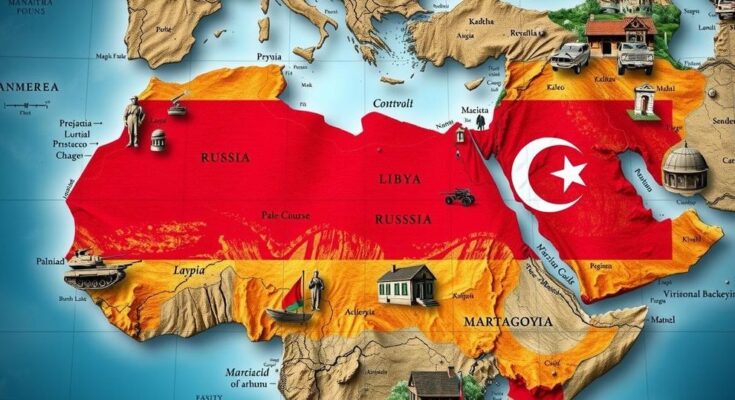Russia is pivoting its focus from Syria to Libya following the political upheaval in Syria that compromised its strategic foothold in the region. With support from Russian mercenaries, Field Marshal Khalifa Haftar leads the charge against the UN-backed government in Tripoli. Military activities are ramping up in Libya, despite challenges posed by competing foreign interests and a fragmented political environment, making Russia’s mission more complex than in Syria.
The recent political upheaval in Syria has prompted Russia to redirect its strategic interests toward Libya as it seeks to find a new foothold in North Africa. With the fall of President Bashar al-Assad, previously a steadfast ally, Russia faces an uncertain future in Syria and is compelled to reassess its military presence in the region. In Libya, Russian mercenaries have been supporting Field Marshal Khalifa Haftar, who controls the eastern territory against the United Nations-recognized Government of National Unity based in Tripoli. Analysts suggest that this shift indicates Russia’s attempt to maintain its influence and operations across Africa.
Russian military activities in Libya have intensified, with reports indicating a significant buildup of troops and military resources in the country. Recent investigative efforts revealed that Russian equipment, including advanced defense systems, has been transferred from Syria to Libya, marking a notable escalation in Moscow’s strategic endeavors in the North African nation. The Kremlin’s goal appears to be one of self-preservation as it navigates the complexities of shifting alliances and regional dynamics exacerbated by the power vacuum left in Syria.
Moreover, strategic experts highlight that Libya holds potential for Russia to disrupt Western interests while exploiting the fractured political landscape. The ongoing competition for influence involves various external actors, including Turkey, which supports the GNU, as well as Egypt and the UAE, both of which have aligned with Haftar. Russia’s actions are carefully monitored by Western nations concerned about the implications of increased Russian military activity in their realms of influence, particularly given Libya’s historical ties with Italy.
Despite the enthusiasm surrounding potential new alliances in Libya, experts caution that sustaining military operations will present challenges. Unlike Syria, characterized by limited Western oversight, Libya’s environment is much more exposed to international scrutiny. As such, the Kremlin must take significant care to manage its involvement while preparing contingencies should its alliances falter. The dynamic nature of Libyan politics and the interests of various powers indicate that Russia’s endeavors there may not mirror the unencumbered operations it conducted under Assad in Syria.
The geopolitical landscape in the Middle East and North Africa has changed dramatically in recent years, particularly with the fall of Bashar al-Assad, an ally of Russia. The loss of this key partnership has prompted the Kremlin to seek new strategic partnerships in other regions, with Libya emerging as a focal point of interest. As a country in political turmoil since the ousting of Muammar Gaddafi in 2011, Libya’s divided governance creates opportunities for external powers like Russia to influence outcomes favorably for their national interests while engaging with various factions.
In summary, Russia’s strategic shift from Syria to Libya illustrates the Kremlin’s adaptive approach in the face of changing political realities. By aligning with Khalifa Haftar and increasing its military presence in Libya, Russia aims to establish a new stronghold in North Africa while seeking to continue its broader ambitions on the continent. However, the complexities of Libyan politics and the presence of multiple external players may complicate Russia’s efforts, leading to potential constraints on its aspirations within the region.
Original Source: thedefensepost.com




